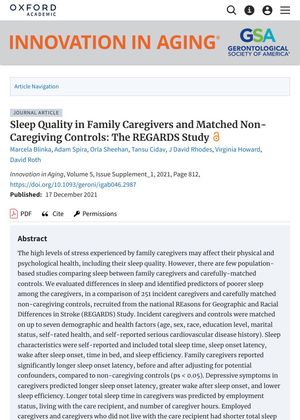Association of Frailty Index with Clinical BPH Progression and Serious Adverse Events: The MTOPS Trial
December 2021
in “
Innovation in Aging
”

TLDR Family caregivers take longer to fall asleep and have more sleep disturbances, which may contribute to their health problems.
The study "Sleep Quality in Family Caregivers and Matched Non-Caregiving Controls: The REGARDS Study" compared sleep patterns between 251 family caregivers and non-caregiving controls, matched on seven demographic and health factors. The study found that family caregivers reported significantly longer sleep onset latency (time it takes to fall asleep) compared to non-caregiving controls. Depressive symptoms in caregivers predicted longer sleep onset latency, greater wake after sleep onset, and lower sleep efficiency. Employment status, living with the care recipient, and number of caregiver hours predicted longer total sleep time in caregivers. The study suggests that further research is needed to evaluate whether sleep disturbances contribute to health problems among caregivers.